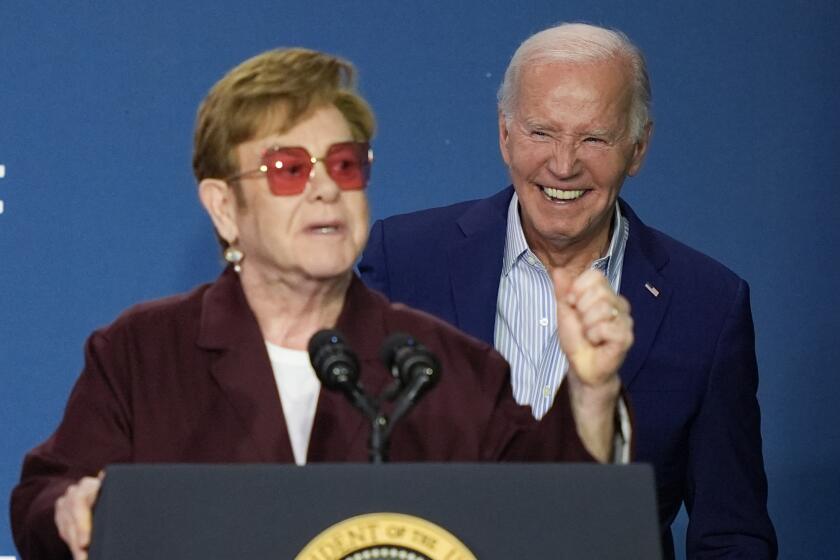Cases Lift Hopes for Property Rights
Champions of property rights took cheer in 1986 when William H. Rehnquist became the chief justice of the United States.
Rehnquist argued that property rights had been “relegated to the status of a poor relation” compared to the 1st Amendment’s rights to free speech or freedom of religion. And twice under his leadership, the Supreme Court ruled to strengthen the rights of property owners.
Since the early 1990s, however, the property rights movement’s progress in the courts has stalled.
Today, in what is likely to be the last term of the Rehnquist Court, the justices take up two disputes that could change that.
One will decide whether cities can condemn homes and small businesses to clear the way for business development. The other tests the government’s power to regulate economic transactions, such as imposing rent controls.
In his first year as chief justice, Rehnquist put together a 5-4 majority in favor of a California homeowner and ruled that the state’s Coastal Commission could not force the homeowner to open his private beachfront to public foot traffic. A few years later, the court said the government must pay a landowner if it bars him from building anything on his property.
“At the beginning [of the Rehnquist Court], it looked tremendously hopeful from a property rights point of view. But after 1992, it’s been downhill,” said R.S. Radford, an attorney for the Pacific Legal Foundation in Sacramento, a conservative property rights group.
Property rights advocates are challenging a 50-year trend in which redevelopment authorities have claimed ever-greater powers under the doctrine of eminent domain.
Though 1954 is best remembered in legal circles as the year of a landmark school desegregation case, the Supreme Court issued another far-reaching ruling that year. While government has long had the power to seize private land for such public uses as highways, the justices declared that cities could also condemn entire blocks as “blighted” and clear the land for redevelopment -- even if it meant knocking down small businesses that were thriving.
After the ruling, “all hell broke loose,” says Gideon Kanner, professor emeritus at the Loyola Law School in Los Angeles and a longtime advocate of property rights.
The 1960s became an era of urban renewal as redevelopment agencies cleared many downtown areas, hoping to spur a revival in the nation’s cities. Sometimes, critics say, they succeeded only in emptying the life from cities.
More recently, redevelopment agencies have used eminent domain to clear away small businesses to make way for big-box retailers such as Wal-Mart or Costco.
In response, some conservative theorists began urging the federal courts to aggressively limit the government’s power to regulate property.
The case attracting the most attention was brought on behalf of Susette Kelo, a registered nurse in New London, Conn., whose house looks out to the waters of Long Island Sound. The city wants to redevelop her neighborhood with a waterfront hotel, an office park and “urban-style” townhouses.
All that stands in the way are Kelo and six other neighbors who refuse to sell their small wood-frame homes.
“If the taking of our property were for a bridge, a road or a firehouse, I would be prepared to sell without a fight,” Kelo said. “This is for private profit, not public use.”
One of her neighbors, Matt Dery, a circulation manager for the local newspaper, said, “We didn’t want to leave, and our house wasn’t for sale.” The same was true for his parents, who live across the street in the house where his mother was born in 1918.
City officials say these redevelopment projects produce public benefits, such as more jobs and tax revenue. And New London’s lawyers say the entire notion of redevelopment is in danger if a few holdouts can block a project.
“This is a small group of hold-outs. No one doubts their sincerity. They want to stay in their homes. But it will have a devastating effect on a lot of cities if the court rules for them,” said Daniel J. Krisch, a Hartford lawyer.
The homeowners say it would be even more devastating if cities were allowed to drive out homeowners as a favor to big developers.
“Then no property in America is safe because anyone’s home can create more jobs if it is replaced by a business, and any small business can generate greater taxes if replaced by a bigger one,” said Dana Berliner, a lawyer for the libertarian Institute for Justice, which represents Kelo and her neighbors.
Says Kanner, “Kelo is a blockbuster.”
The other case to be heard this week tests whether the court will go further than before to knock down laws that regulate rents or other economic transactions.
The U.S. 9th Circuit Court of Appeals in San Francisco, though viewed as a liberal court, has handed down several recent rulings saying that rent control amounts to the taking of private property.
The test case arose in Hawaii, where lawmakers were trying to control the nation’s highest prices for gasoline by fostering competition.
In hopes of preserving its remaining independent service stations, the Hawaii Legislature limited the rents that could be charged them. Chevron, which owned stations and rented them to independent operators, sued on grounds that limiting the rent it could charge had the effect of taking its property.
Last year, the 9th Circuit agreed with Chevron. The Hawaii rent control law is unconstitutional, its judges said, because the limit on fees paid by the service stations did not “substantially advance” the state’s goal of protecting consumers from higher gas prices.
Hawaii Gov. Linda Lingle appealed, arguing that judges were not empowered to “second-guess the reasonableness of legislative policy judgments.” If the high court were to agree with Chevron’s argument, it could trigger a new wave of legal challenges to regulatory laws.
“Since the late 1930s, the Supreme Court has generally refrained from second-guessing decisions by elected officials to enact business regulations, health and safety laws [or] land-use controls,” said Timothy Dowling, a lawyer for the Community Rights Counsel in Washington. A victory for Chevron may signal “a significant change in this constitutional landscape,” he said.
More to Read
Get the L.A. Times Politics newsletter
Deeply reported insights into legislation, politics and policy from Sacramento, Washington and beyond. In your inbox three times per week.
You may occasionally receive promotional content from the Los Angeles Times.







